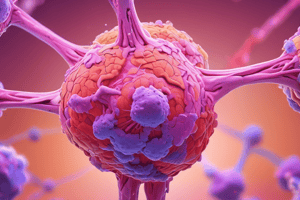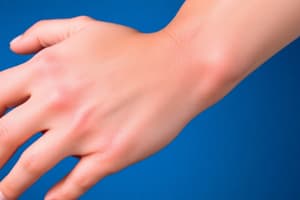Podcast
Questions and Answers
What is the most common cause of death in patients with Systemic Sclerosis?
What is the most common cause of death in patients with Systemic Sclerosis?
- Vasculitis and resultant disease (correct)
- Pulmonary fibrosis
- Renal crisis
- Cardiac failure
Which of the following is a characteristic of CREST syndrome, a variant of Systemic Sclerosis?
Which of the following is a characteristic of CREST syndrome, a variant of Systemic Sclerosis?
- Subcutaneous calcinosis (correct)
- Raynaud's phenomenon
- Heliotrope rash
- Esophageal dysmotility
What is a common feature of Dermatomyositis/Polymyositis (DM-PM)?
What is a common feature of Dermatomyositis/Polymyositis (DM-PM)?
- Muscle hypertrophy
- Proximal limb weakness (correct)
- Distal limb weakness
- Skeletal muscle atrophy
What is the characteristic rash of Dermatomyositis?
What is the characteristic rash of Dermatomyositis?
What is the main difference between Primary, Idiopathic DM and Primary, Idiopathic PM?
What is the main difference between Primary, Idiopathic DM and Primary, Idiopathic PM?
What is a common complication of Systemic Sclerosis?
What is a common complication of Systemic Sclerosis?
What is the etiology of Dermatomyositis/Polymyositis (DM-PM)?
What is the etiology of Dermatomyositis/Polymyositis (DM-PM)?
Which of the following is a subgroup of Dermatomyositis/Polymyositis (DM-PM)?
Which of the following is a subgroup of Dermatomyositis/Polymyositis (DM-PM)?
What is the 2nd form of joint disease seen in SLE?
What is the 2nd form of joint disease seen in SLE?
Which of the following is a systemic manifestation of SLE?
Which of the following is a systemic manifestation of SLE?
What is the epidemiology of SLE in terms of age of onset?
What is the epidemiology of SLE in terms of age of onset?
What is the characteristic skin rash seen in SLE?
What is the characteristic skin rash seen in SLE?
What is the diagnostic criteria for Sjogren's disease?
What is the diagnostic criteria for Sjogren's disease?
What is the primary symptom of Sjogren's disease?
What is the primary symptom of Sjogren's disease?
What is the characteristic extraglandular manifestation of Sjogren's disease?
What is the characteristic extraglandular manifestation of Sjogren's disease?
What is the type of connective tissue disorder that Sjogren's disease is classified as?
What is the type of connective tissue disorder that Sjogren's disease is classified as?
Which of the following autoimmune diseases is an organ-specific disease?
Which of the following autoimmune diseases is an organ-specific disease?
What is a characteristic of systemic autoimmune diseases?
What is a characteristic of systemic autoimmune diseases?
Which of the following is a systemic autoimmune disease?
Which of the following is a systemic autoimmune disease?
What is a characteristic of Systemic Sclerosis?
What is a characteristic of Systemic Sclerosis?
What is a common feature of autoimmune diseases?
What is a common feature of autoimmune diseases?
What is a risk factor for developing Systemic Sclerosis?
What is a risk factor for developing Systemic Sclerosis?
Flashcards are hidden until you start studying
Study Notes
Progressive Systemic Scleroderma (PSS)
- Infiltration of muscle leads to weakness
- Kidneys affected by vasculitis, resulting in high mortality rate
- May also have Raynaud's phenomenon
- CREST syndrome variant: subcutaneous calcinosis, Raynaud's phenomenon, esophageal dysfunction, sclerodactyly, and telangiectasia
Clinical Features of PSS
- Raynaud's phenomenon and esophageal dysmotility
- Skin thickening and pulmonary fibrosis
- Subcutaneous calcinosis and isolated pulmonary arterial hypertension
- Telangiectasia and congestive heart failure
- Arthralgia and arthritis, and renal crisis
- Myopathy
Dermatomyositis/Polymyositis (DM-PM)
- Inflammation of muscles with or without rashes
- Etiology unknown, but abnormal immunoregulation and viral causes suspected
- Autoimmune disease
- Polymyositis: skeletal muscle damaged by non-suppurative inflammatory process characterized by lymphocyte infiltration
- Dermatomyositis: polymyositis plus skin rash (diffuse erythema, maculopapular eruption, dermatitis)
- Insidious onset
- Findings: proximal limb weakness, pain in buttocks and thigh, heliotrope rash, itching, periorbital edema, and subcutaneous calcification
5 Subtypes of DM-PM
- I: Primary, idiopathic PM
- II: Primary, idiopathic DM
- III: DM/PM associated with malignancy or neoplasia
- IV: DM/PM of childhood associated with vasculitis
- V: DM/PM associated with other collagen vascular disease (SLE, RA, PSS)
Group I: Primary, Idiopathic PM
- Insidious onset
- Begins with pelvic girdle weakness, later involving shoulder girdle
- Moderate arthritis, Raynaud's disease, dysphagia, and dysphonia may be present
- Remission and exacerbations common
Group II: Primary, Idiopathic DM
- Acute onset with proximal shoulder and pelvic girdle involvement
- Erythematous heliotropic rash on the skin of the eyelids and dorsum of the hands
Autoimmune Diseases
- Condition in which host immune response against self-components contributes to pathogenesis
- Two types: organ-specific (antibodies attack only cells of parts of particular organ) and systemic (various organ cells can be attacked)
- Examples: Multiple sclerosis, Insulin dependent DM, Myasthenia Gravis, Grave's disease, Addison's disease, Rheumatoid arthritis, SLE, Sjogren's, Scleroderma, Dermatomyositis, Polymyositis, Mixed CTD
Common Characteristics of Autoimmune Diseases
- Autoantibodies-markers (ANA, rheumatoid factor)
- Often associated with genetic and viral and environmental factors
- Female predisposition
Systemic Sclerosis
- Diffuse cutaneous scleroderma: rapid progression, symmetric skin thickening in proximal and distal limbs, face, and trunk, visceral involvement likely
- Localized cutaneous scleroderma: skin thickening limited to distal limbs and face, often has features of CREST syndrome
Description
- Epidemiology: rare, 30-40 y/o, F>M (3:1), increased risk: blacks, pregnancy, stone masonry, coal/gold/uranium exposure
- In PSS, excessive amounts of abnormal collagen cause thickening of the skin and difficulty in moving joints
- Fibrosis affects GIT motility, lung air exchange, pericardial expansion, and motion, resulting in associated systemic manifestations
Other Connective Tissue Diseases
- SLE: 2nd form of joint disease seen in SLE, avascular necrosis frequently in knees, hips, and shoulders
- Pain relief in avascular necrosis mainly by reducing weightbearing
- Patellar and Achilles tendon ruptures may occur
- Systemic manifestations include: wolf-like skin rash, renal failure, central & peripheral nervous system abnormalities, hematologic problems, systemic cutaneous vasculitis, pleurisy
SLE
- Epidemiology: onset any age, but often 15-25 y/o, F>M (3:1 to 8:1), blacks, Asians
- Manifestations: systemic, musculoskeletal, cutaneous, hematologic, neurologic, cardiopulmonary, renal, GIT, ocular, and fetal loss
1982 Criteria for SLE
- Malar rash, renal disorder, discoid rash, neurologic disorder, photosensitivity, hematologic disorder, oral ulcers, immunologic disorder, arthritis, serositis, antinuclear antibodies
Sjogren's Disease
- Manifestations: xerostomia, dry eyes, dry nose, throat, and trachea, esophageal mucosal atrophy, gastritis, pancreatitis, dyspareunia, and extraglandular manifestations (rare)
- Diagnostic criteria: ocular symptoms, oral symptoms, ocular signs, histopathology, and salivary gland
- Criteria definitions: dry eyes, oral symptoms, Schirmer's test, rose Bengal score, and focus score
Studying That Suits You
Use AI to generate personalized quizzes and flashcards to suit your learning preferences.




